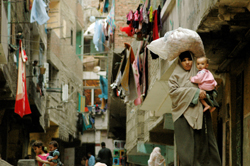|
End of Free Health Care Hits Poor Hardest
IRIN
February 15, 2010
Egypt

Millions of poor Egyptians have no health insurance and have relied on the government to pay for medical treatment
Hesham Gohary says he has been coming to the Health Ministry in central Cairo for weeks in the hope of getting free kidney dialysis treatment, but always leaves empty-handed.
The 54-year-old farmer is one of 35,000 low-income kidney failure patients whose collective US$118 million health bill used to be footed by the government, until it recently declared its coffers empty.
“I badly need the dialysis,” Gohary told IRIN. “But it seems so difficult to get free treatment in this country these days.”
Around 35 million of the country’s 80 million people are in the state health insurance system, according to the Health Ministry, and most of the rest are supposed to get free health care.
Those seeking free treatment must make their case at a Health Ministry office and, if successful, receive an official letter authorizing public hospitals to treat them for free. The hospitals then reclaim payment from the ministry.
Last year, the government gave free treatment to 2.2 million poor Egyptians, including kidney failure, cancer, diabetes and high blood pressure patients, according to Mohamed Abdeen, chairman of the Specialized Medical Councils, the part of the Health Ministry which determines whether a patient qualifies for free treatment or not.
A Problem of Money
But the government has incurred debts of US$219 million to hospitals and is no longer able to pay its health bills, and since mid-December 2009 hospitals have stopped treating the patients it sends to them.
“This is a problem of money,” Abdeen told IRIN. “The hospitals can’t do anything else. If they don’t get money, they won’t be able to offer treatment or medicine for these people.”
Gohary used to receive kidney dialysis treatment 12 hours a week at a cost to the government of $3,302 a year - a small fortune for him.
“I really can’t pay for my treatment. And it’s hard for me to work because repeated dialyses have made my body frail,” he said.
The Health Ministry says around 700,000 high blood pressure and diabetes patients used to receive free health care at an annual cost of $183 million; and around 25,000 cancer patients cost the government $51 million annually.
Egypt's economy grew by 7.1 percent in 2007, 7.2 percent in 2008 but just 4 percent in 2009, according to the government. Independent analysts say the loss to the economy because of the global financial crisis is bigger than the government is willing to admit.
Meanwhile, individuals like Gohary are facing the consequences: “I suffer bleeding every time I undergo the dialysis… This costs me 300 pounds [$55] in medication every month. This money and the cost of the dialysis are too big for my sons to be able to pay.”
More
Information on World Health Issues
Copyright © Global Action on Aging
Terms of Use |
Privacy Policy | Contact
Us
|



